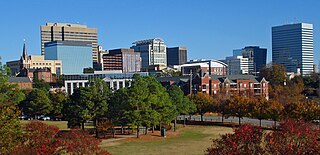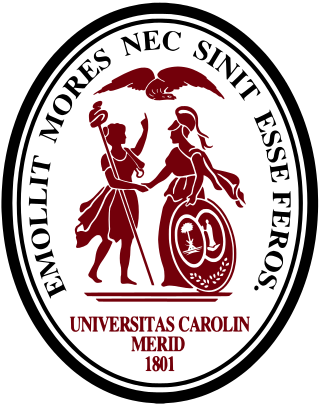
Columbia is the capital city of the U.S. state of South Carolina. With a population of 136,632 at the 2020 census, it is the second-most populous city in South Carolina. The city serves as the county seat of Richland County, and a portion of the city extends into neighboring Lexington County. It is the center of the Columbia, SC Metropolitan Statistical Area, which had an estimated population of 858,302 in 2023, and is the 70th-most populous metropolitan statistical area in the United States. The name Columbia is a poetic term used for the United States, derived from the name of Christopher Columbus, who explored for the Spanish Crown. Columbia is often abbreviated as Cola, leading to its nickname as "Soda City".

The University of South Carolina is a public research university in Columbia, South Carolina, United States. Founded in 1801 as South Carolina College, It is the flagship of the University of South Carolina System and the largest university in the state by enrollment. Its main campus is on over 359 acres (145 ha) in downtown Columbia, close to the South Carolina State House. The university is classified among "R1: Doctoral Universities with Highest Research Activity". It houses the largest collection of Robert Burns and Scottish literature materials outside Scotland and the world's largest Ernest Hemingway collection.

The South Carolina Gamecocks represent the University of South Carolina in the NCAA Division I.

Founders Park, formerly known as Carolina Stadium, is a stadium in Columbia, South Carolina on the banks of the Congaree River. The facility was built for a cost of $35.6 million and is used for college baseball as home to the University of South Carolina Gamecocks baseball team.

Cocky is the costumed mascot of the University of South Carolina athletics teams. He represents a cartoon version of a gamecock. Cocky has won several mascot national championships. In 2019, for the 150th anniversary of college football, Sports Illustrated selected him as one of the greatest mascots in college football history.
The Clemson–South Carolina rivalry is an American collegiate athletic rivalry between the Clemson University Tigers and the University of South Carolina Gamecocks, the two largest universities in the state of South Carolina. Since 2015, the two compete in the Palmetto Series, which consists of more than a dozen athletic, head-to-head matchups each school year. South Carolina leads the all-sport series 5–1, after Clemson won the 2023–24 series. Both institutions are public universities supported by the state, and their campuses are separated by only 132 miles. South Carolina and Clemson have been bitter rivals since 1896, and a heated rivalry continues to this day for a variety of reasons, including the historic tensions regarding their respective charters and the passions surrounding their athletic programs. It has often been listed as one of the best rivalries in college sports.

The South Carolina Gamecocks football program represents the University of South Carolina. The Gamecocks compete in the Football Bowl Subdivision of the National Collegiate Athletic Association (NCAA) and the Southeastern Conference. The team's head coach is Shane Beamer. They play their home games at Williams–Brice Stadium.

The South Carolina Gamecocks men's basketball team represents the University of South Carolina and competes in the Southeastern Conference (SEC). The Gamecocks won Southern Conference titles in 1927, 1933, 1934, and 1945, and then they gained national attention under hall of fame coach Frank McGuire, posting a 205–65 record from 1967 to 1976, which included the 1970 Atlantic Coast Conference (ACC) championship, the 1971 ACC Tournament title, and four consecutive NCAA tournament appearances from 1971 to 1974. The program also won the 1997 SEC championship, National Invitation Tournament (NIT) titles in 2005 and 2006, and a share of the 2009 SEC East division title. Most recently, the Gamecocks won the 2017 NCAA East Regional Championship, reaching the Final Four for the first time in school history. Lamont Paris is the current head coach, and the team plays at the 18,000-seat Colonial Life Arena.

The Carolina Band, or the Mighty Sound of the Southeast, is the official marching band of the University of South Carolina. With an average membership of 360, it is the largest ensemble associated with the university's School of Music. The marching band performs at all South Carolina Gamecocks football home games played at Williams-Brice Stadium, as well as neutral site games, bowl games, and all games against Clemson, where both the Carolina Band and Clemson's Tiger Band both perform at half time regardless of which school is hosting on a given year.

The 1969 South Carolina Gamecocks football team represented the University of South Carolina as a member of the Atlantic Coast Conference (ACC) during the 1969 NCAA University Division football season. Led by fourth-year head coach Paul Dietzel, the Gamecocks compiled an overall record of 7–4 with a mark of 6–0 in conference play, winning the ACC title, which remains their only conference championship in program history. It was also South Carolina's first winning season since 1959. South Carolina was invited to the Peach Bowl, where they were defeated by West Virginia. The team played home games at Carolina Stadium in Columbia, South Carolina.
Innovista is the economic development arm of the University of South Carolina.

Robert Louis Caslen Jr. is a retired United States Army officer who served as the 59th superintendent of West Point from 2013 until 2018 and as the 29th president of the University of South Carolina from July 2019 until May 2021. Between January and May 2019, Caslen was senior counsel to the president and interim chief financial officer at the University of Central Florida. On July 19, 2019, the board of trustees of the University of South Carolina elected him as the school's 29th president, a position he assumed on August 1, 2019. Caslen also served as HigherEchelon's Special Advisor on Executive Leadership and Character Development. He resigned as president at South Carolina on May 12, 2021.

Louis Cody Sossamon was an American football center and linebacker who played three seasons with the New York Yankees of the All-America Football Conference (AAFC). He played college football at the University of South Carolina, having previously attended high school in his hometown of Gaffney, South Carolina.
William Whitmire is an American politician. He is a member of the South Carolina House of Representatives from the 1st District, serving since 2003. He is a member of the Republican Party.

The 2019 South Carolina Gamecocks football team represented the University of South Carolina in the 2019 NCAA Division I FBS football season. This season marked the Gamecocks 126th overall season, 28th as a member of the SEC East Division. The Gamecocks played their home games at Williams–Brice Stadium in Columbia, South Carolina, and were led by fourth-year head coach Will Muschamp.
Sami's Law is a piece of federal legislation in the United States introduced by Representative Christopher Smith of New Jersey as H.R. 3262. The bill was introduced in May 2019 and was signed into law on January 5, 2023 by President Joe Biden. The bill would require ridesharing company drivers to prominently display lighted signs and a scannable QR code as a safety regulation in light of issues tied to the ride-sharing service. The bill would criminalize misrepresentation of being a driver of a ride-sharing service nationwide. The bill was named for South Carolina college student Samantha Josephson, who had ordered an Uber but mistakenly entered an imposter vehicle and was killed by the driver. On June 14, 2019, the law was referred to the Subcommittee on Highways and Transit.

The murder of Samantha Josephson, a student at University of South Carolina, in Columbia, South Carolina, occurred on March 29, 2019. Josephson, 21, had ordered an Uber and mistakenly entered a car that she thought was her ride. Nathaniel Rowland, the driver of the car, used childproof locks to prevent Josephson from leaving the vehicle and kidnapped and murdered her, leaving her body near New Zion, South Carolina – 65 miles (105 km) from Columbia, where she had entered Rowland's car.

Steve Spurrier, former national championship-winning head football coach at the University of Florida, served as the head coach of the University of South Carolina Gamecocks football team from November 23, 2004, until October 12, 2015. It was Spurrier's fifth tenure as a head coach, his second longest tenure as a head coach, and his third and final tenure as a head coach in college football. He served as South Carolina's 32nd head coach.

The 2020 South Carolina Gamecocks football team represented the University of South Carolina in the 2020 NCAA Division I FBS football season. The season marked the Gamecocks' 127th overall season, and 29th as a member of the SEC East Division. The Gamecocks played their home games at Williams–Brice Stadium in Columbia, South Carolina, and were led by head coach Will Muschamp until his firing on November 15. Mike Bobo, the team's offensive coordinator and quarterbacks coach, was named interim head coach for the remainder of the season.

Michael Amiridis is a Greek-American academic who serves as the 30th president of the University of South Carolina. Prior to this position, he served as chancellor of the University of Illinois Chicago from 2015 to 2022.













